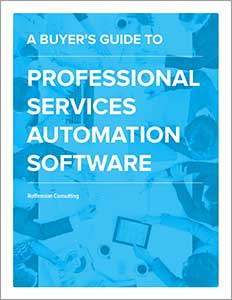The primary users of a PSA solution in a PSO are knowledge workers. Their success relies on the productivity tools they employ and the ease of to access them. With that being the case, PSOs have a very low tolerance for adopting poorly designed toolsets. Yet, the enterprise software world has been lagging in delivering well-designed solutions (in comparison to consumer facing applications). Perhaps for the mere fact that enterprise solutions are imposed on most users where consumer applications are employed by choice.
 Organizations need to consider the impact of a poorly designed PSA solution. For one, improper use or cobbled “workarounds” adopted by system users in badly designed solutions tend to create more work and inefficiencies. Furthermore, limited of access to data on mobile devices has created a gap in they way organizations can competitively deliver their services. Compound this reality with the heavy reliance on an enterprise solution that runs the business and the potential of failure is heightened.
Organizations need to consider the impact of a poorly designed PSA solution. For one, improper use or cobbled “workarounds” adopted by system users in badly designed solutions tend to create more work and inefficiencies. Furthermore, limited of access to data on mobile devices has created a gap in they way organizations can competitively deliver their services. Compound this reality with the heavy reliance on an enterprise solution that runs the business and the potential of failure is heightened.
As a first step in the right direction, a PSO looking for a PSA solution, at a minimum, needs to ask potential vendors about their UX strategy and how product development is integrating into their road map. Moreover, does this strategy extend beyond the desktop and incorporate the increasingly important role mobile plays in building a successful PSO? Having a good understanding of the approach a vendor takes can ultimately mean the difference between software success and “shelfware” failure.
 To learn successful strategies in selecting the right Professional Services Automation (PSA) solution, download right now your complimentary Software Buyer’s Guide for PSA!
To learn successful strategies in selecting the right Professional Services Automation (PSA) solution, download right now your complimentary Software Buyer’s Guide for PSA!
UX Matters: A Poorly Designed PSA Solution Will Impact Your Bottom Line – part 1 »
About the Author: Neil Stolovitsky has over 16 years of IT experience with end-user, consulting, and vendor organizations, along with extensive expertise in business development, software selection, and channel strategies. He has published numerous white papers and articles covering Professional Services Automation, Enterprise Resource Planning (ERP) for service industries, Project Portfolio Management, IT Governance, and New Product Development to a global audience. Neil currently holds the position of Senior Solution Consultant with Upland Software.

